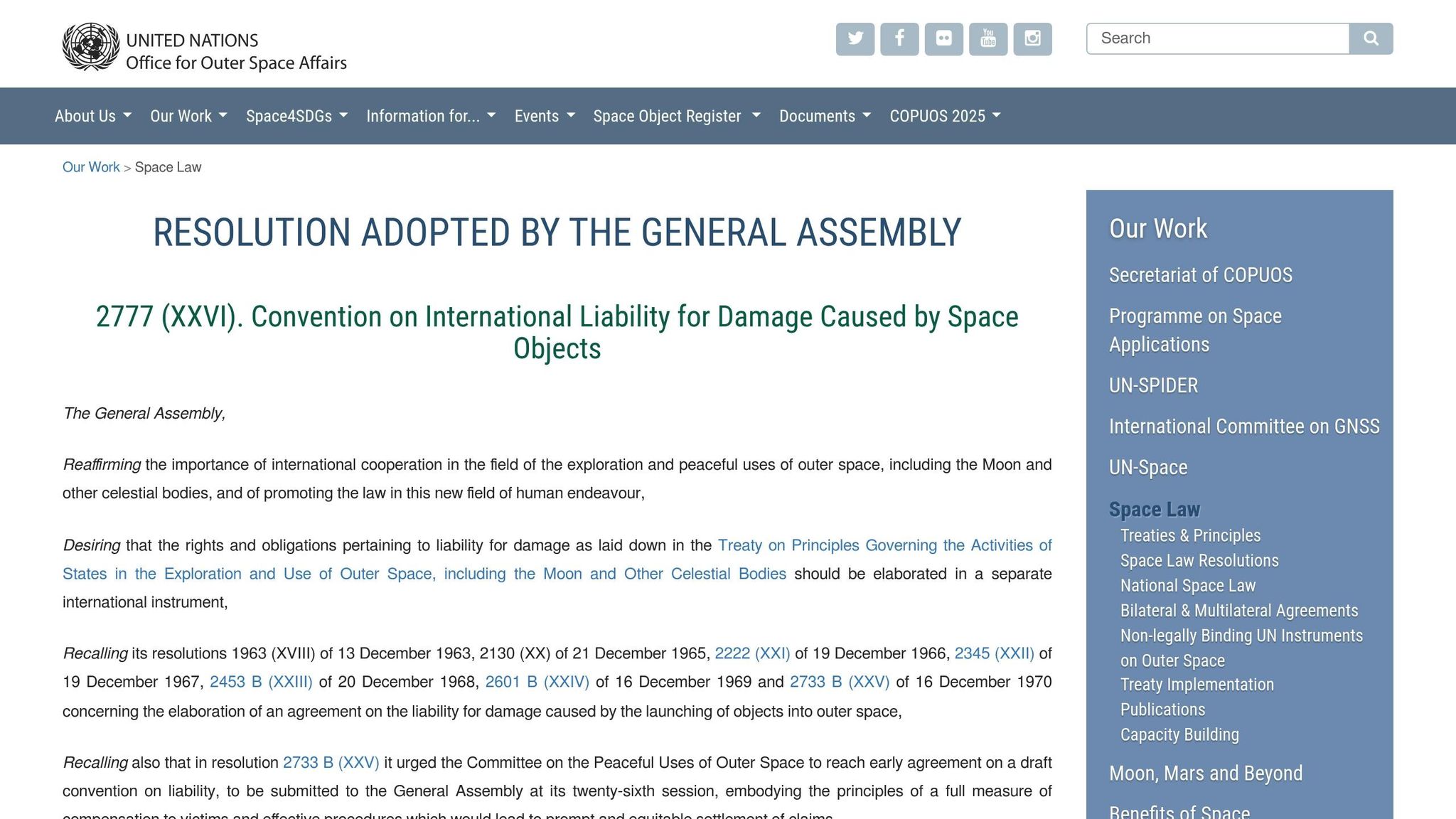How Space Treaties Shape Private Space Investments
Explore how international space treaties influence private investments, shaping opportunities and risks in the emerging space economy.

- Space Treaties Impact Investments: Space treaties like the 1967 Outer Space Treaty, Liability Convention, and Artemis Accords establish legal boundaries and opportunities for private space ventures.
- Resource Ownership Rules: While countries can't claim space territory, companies can extract and own resources under specific guidelines, such as the U.S. Commercial Space Launch Competitiveness Act.
- Risk and Liability: Treaties outline liability for damages caused by space activities, requiring companies to invest in insurance and risk management.
- Compliance Costs: Companies must meet strict regulations, including licensing, debris mitigation, and operational reporting, which increase costs but ensure safe practices.
- Opportunities Through Partnerships: Collaborating with governments and leveraging treaty frameworks can help businesses navigate regulations and expand in areas like satellite technology.
Understanding these treaties is essential for investors to evaluate risks, seize opportunities, and make informed decisions in the growing space economy.
Space Law Explained
Main Space Treaties for Investors
The rules governing space activities are shaped by several international treaties, which are essential for anyone looking to invest in space ventures. These agreements outline key principles for areas like property rights, liability, and government oversight, all of which directly impact commercial strategies.
The Outer Space Treaty
Signed in 1967, the Outer Space Treaty is the foundation of international space law. It lays out broad principles that guide property rights and regulatory duties in space. For investors, understanding these rules is crucial, as they influence how private companies can operate beyond Earth's atmosphere.
Space Liability Convention

The Liability Convention defines who is financially responsible for damages caused by space activities. It covers incidents both on Earth and in space, offering a clear framework for assessing financial risks. This is a key consideration for investors evaluating the potential costs tied to space operations.
The Artemis Accords

Introduced in 2020, the Artemis Accords represent a modern take on international space cooperation. These agreements focus on operational guidelines and encourage collaboration, especially for activities on the Moon and resource extraction in space. For investors, the evolving standards within the Artemis Accords open up new possibilities for commercial opportunities.
How Treaties Shape Investment Choices
Space treaties play a key role in shaping investment strategies, offering opportunities while imposing certain limitations. These factors influence the strategic decisions outlined below.
Space Property Rights
Space treaties dictate how resources in space can be owned and used, which directly impacts mining and exploration plans. The Outer Space Treaty prevents nations from claiming territory in space but does allow commercial resource extraction under specific rules. For example, the U.S. Commercial Space Launch Competitiveness Act of 2015 gives American companies the right to own resources they extract, as long as they follow international guidelines. This legal framework has inspired businesses to focus on mining lunar resources as part of their growth strategies.
Managing Space Risks
Treaties also define liability rules for space operations. The Liability Convention holds companies responsible for damages caused during space activities, whether in orbit or on Earth. To address these risks, businesses invest heavily in insurance and risk management systems. These cover everything from launch failures to on-orbit incidents and potential third-party claims.
Meeting Legal Requirements
Complying with space treaties comes with operational challenges that can drive up costs. For instance, companies must obtain national licenses, follow debris mitigation protocols, maintain detailed operational records, and submit compliance reports. Satellite operators, in particular, need to show they have plans for safely managing their satellites at the end of their operational life, which often requires extra technical investments. Companies working across different countries also face varying interpretations of treaty rules, making expert legal advice crucial for staying compliant.
Investment Options Under Treaties
Partnering with Governments
Space treaties encourage partnerships between private companies and governments. These partnerships help businesses navigate regulatory hurdles while tapping into government expertise and resources. A great example is NASA's Commercial Crew Program, which shows how treaties support collaboration on spacecraft development and missions to the International Space Station (ISS). Treaties also play a role in expanding commercial opportunities, particularly in satellite technology.
Expanding the Satellite Industry
Rules established under treaties help streamline processes like orbital slot allocation, frequency coordination, and debris management for satellite operations. This consistency boosts investment in cutting-edge satellite technology used in telecommunications, Earth observation, and navigation. As treaties are updated, they continue to support industry growth and responsible practices in space.
Investment Risks and Solutions
Investors face a mix of well-known regulatory challenges and new uncertainties, making effective risk management more important than ever.
Legal Gray Areas
Space treaties often lack clarity, leaving private investors in uncertain territory. For example, the Outer Space Treaty includes a non-appropriation clause, which can be interpreted in various ways when it comes to extracting resources. Additionally, these treaties don't always account for advancements in technology, forcing investors to navigate shifting legal frameworks.
Different Country Rules
National laws vary widely, adding another layer of complexity to cross-border investments. To address these challenges, investors need legal strategies tailored to specific jurisdictions. These strategies should align with broader legal systems to help guide safer decision-making.
Reducing Investment Risk
To manage these risks, investors can take the following steps:
- Perform detailed regulatory due diligence to understand the legal landscape.
- Obtain specialized insurance to cover compliance and operational risks.
- Hire experienced space law experts to navigate complex legal issues.
Conclusion
Space treaties play a key role in shaping the rules for private space investments. These agreements set clear boundaries but also create opportunities for investors who understand how to navigate the regulatory environment.
Investment Tips
To make informed decisions, consider these steps:
- Stay Updated on Treaties: Keep track of changes and interpretations related to space treaties, especially the Outer Space Treaty and Artemis Accords.
- Watch Market Trends: Pay attention to funding rounds, launch successes, and new developments in the industry to time your investments wisely.
Learn More
Looking for more details on private space investments? Check out the SpaceX Stock Investment Guide. It offers resources on valuation metrics, market trends, and strategies tailored for private market investing in the space sector.
As space laws continue to evolve, understanding their impact can help investors seize new opportunities while staying compliant.
Comments ()